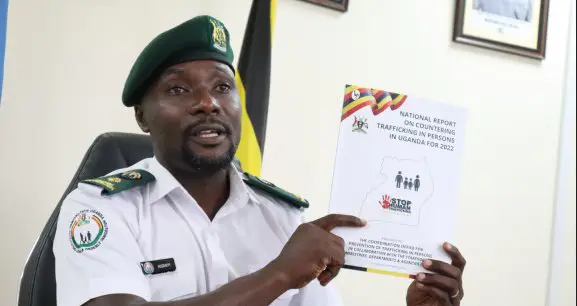Uganda’s human trafficking statistics paint a grim picture of exploitation and abuse, with children accounting for a staggering 79 per cent of the identified victims, a development described as “deeply troubling” by Kigenyi Basalirwa Eric, from the Coordination Office against Human Trafficking.
During a press briefing held at the Police Headquarters in Naguru on Monday, Basalirwa provided a comprehensive update on the status of human trafficking in the country, revealing that as of 1st December 2024, a total of 3,259 cases had been recorded. These cases involved 4,965 victims, an alarming number that underscores the urgent need for action.
Basalirwa explained that of the victims, 2,543 were children, highlighting their heightened vulnerability to trafficking. The figures further showed that adult victims accounted for 452 individuals, while 55 cases involved both children and adults. “This is not just alarming but a national emergency that calls for concerted efforts. Domestic trafficking accounts for 93.4 per cent of all cases, with transnational trafficking contributing 6.6 per cent, making it clear that the majority of these crimes are perpetrated within our borders,” he said.
The briefing detailed the different types of trafficking, with sex trafficking leading the statistics at 1,937 cases, followed by labour trafficking with 658 cases. Instances where victims were exploited for both sexual and labor purposes stood at 144, while other categories of trafficking accounted for a combined 520 cases.
Basalirwa highlighted that these crimes are not distributed evenly across the country but rather show patterns linked to regional vulnerabilities. Mbale emerged as the most affected region, with 373 reported cases, followed by Kampala at 313 and Masaka at 257. Other regions, such as Jinja (253 cases) and Nakawa (233 cases), also reported significant numbers.
Basalirwa commended the efforts of investigators and prosecutors, attributing the increase in reported cases to growing awareness and better reporting mechanisms. However, he acknowledged the need for greater community engagement, particularly in regions with lower case numbers, to ensure no victim goes unprotected.
A particularly alarming trend highlighted during the briefing was the rise in online trafficking. “Traffickers are increasingly exploiting digital platforms to perpetrate their crimes, targeting unsuspecting individuals with investment scams, fake job offers, and online shopping fraud,” Basalirwa warned that traffickers are now adept at using social media and other online platforms to lure victims, especially vulnerable groups such as children and young adults.
“Online traffickers prey on people’s financial vulnerabilities and emotional needs. Many Ugandans have been duped into sending money for fraudulent investment schemes or romantic relationships that turn out to be trapped. Others are exploited through fake job offers or scammed while shopping online,” Basalirwa said.
He called for greater vigilance among internet users, urging them to verify the authenticity of online transactions and avoid engaging with unverified platforms.
Parents were also urged to monitor their children’s activities during the ongoing school holiday season and coming festive season as traffickers are known to exploit periods when children are left unsupervised.
He also noted that many children are targeted through gadgets such as phones and tablets, often leading to their involvement in online pornography and other forms of exploitation. “Traffickers know your schedules and will take advantage of children being left home alone. Parents must remain alert and ensure their children are aware of the dangers they face,” he cautioned.
The briefing also shed light on legal efforts to hold labour export companies accountable for the safety of migrant workers. Basalirwa referenced a recent High Court ruling where a labour export company was fined for failing to protect the life of a Ugandan worker in Saudi Arabia. He emphasized that this precedent serves as a warning to all labour export firms to fulfil their contractual obligations and prioritize the welfare of Ugandan workers abroad.
Basalirwa concluded with a call to action, urging all stakeholders, including government agencies, civil society organizations, and the general public, to play an active role in combating human trafficking. He stressed the importance of reporting suspicious activities to law enforcement and promoting community awareness to prevent trafficking before it occurs.
Do you have a story in your community or an opinion to share with us: Email us at editorial@watchdoguganda.com













